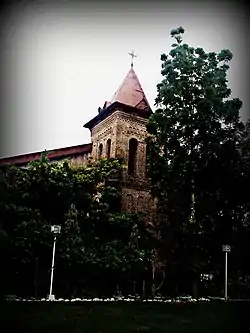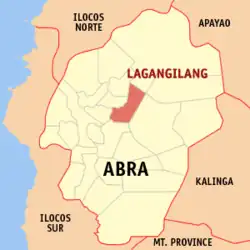Lagangilang | |
|---|---|
| Municipality of Lagangilang | |
 Holy Cross Parish Church of Lagangilang | |
 Flag  Seal | |
 Map of Abra with Lagangilang highlighted | |
OpenStreetMap | |
.svg.png.webp) Lagangilang Location within the Philippines | |
| Coordinates: 17°37′N 120°44′E / 17.61°N 120.73°E | |
| Country | Philippines |
| Region | Cordillera Administrative Region |
| Province | Abra |
| District | Lone district |
| Barangays | 17 (see Barangays) |
| Government | |
| • Type | Sangguniang Bayan |
| • Mayor | Rovelyn E. Villamor |
| • Vice Mayor | Paul Joseph Q. Abaya |
| • Representative | Menchie B. Bernos |
| • Municipal Council | Members |
| • Electorate | 10,614 voters (2022) |
| Area | |
| • Total | 101.44 km2 (39.17 sq mi) |
| Elevation | 111 m (364 ft) |
| Highest elevation | 343 m (1,125 ft) |
| Lowest elevation | 49 m (161 ft) |
| Population (2020 census)[3] | |
| • Total | 14,914 |
| • Density | 150/km2 (380/sq mi) |
| • Households | 3,415 |
| Economy | |
| • Income class | 5th municipal income class |
| • Poverty incidence | 19.39 |
| • Revenue | ₱ |
| • Assets | ₱ |
| • Expenditure | ₱ |
| • Liabilities | ₱ |
| Service provider | |
| • Electricity | Abra Electric Cooperative (ABRECO) |
| Time zone | UTC+8 (PST) |
| ZIP code | 2802 |
| PSGC | |
| IDD : area code | +63 (0)74 |
| Native languages | Ilocano Tagalog |
Lagangilang, officially the Municipality of Lagangilang (Ilocano: Ili ti Lagangilang; Tagalog: Bayan ng Lagangilang), is a 5th class municipality in the province of Abra, Philippines. According to the 2020 census, it has a population of 14,914 people.[3]
Geography
Lagangilang is located at 17°37′N 120°44′E / 17.61°N 120.73°E.
According to the Philippine Statistics Authority, the municipality has a land area of 101.44 square kilometres (39.17 sq mi) [5] constituting 2.44% of the 4,165.25-square-kilometre- (1,608.21 sq mi) total area of Abra.
Barangays
Lagangilang is politically subdivided into 17 barangays.[6] Each barangay consists of puroks and some have sitios.
| PSGC | Barangay | Population | ±% p.a. | |||
|---|---|---|---|---|---|---|
| 2020[3] | 2010[7] | |||||
| 140110001 | Aguet | 1.8% | 268 | 288 | −0.72% | |
| 140110002 | Bacooc | 2.5% | 369 | 379 | −0.27% | |
| 140110003 | Balais | 3.0% | 448 | 533 | −1.72% | |
| 140110004 | Cayapa | 6.0% | 899 | 992 | −0.98% | |
| 140110005 | Dalaguisen | 5.6% | 835 | 840 | −0.06% | |
| 140110006 | Laang | 5.0% | 753 | 797 | −0.57% | |
| 140110007 | Lagben | 3.0% | 452 | 397 | 1.31% | |
| 140110008 | Laguiben | 6.3% | 947 | 944 | 0.03% | |
| 140110009 | Nagtipulan | 8.4% | 1,258 | 1,209 | 0.40% | |
| 140110010 | Nagtupacan | 7.9% | 1,177 | 1,059 | 1.06% | |
| 140110011 | Paganao | 2.5% | 376 | 342 | 0.95% | |
| 140110012 | Pawa | 2.4% | 358 | 360 | −0.06% | |
| 140110013 | Poblacion | 10.0% | 1,488 | 1,473 | 0.10% | |
| 140110014 | Presentar | 5.3% | 783 | 725 | 0.77% | |
| 140110015 | San Isidro | 10.1% | 1,501 | 1,415 | 0.59% | |
| 140110016 | Tagodtod | 12.5% | 1,863 | 1,617 | 1.43% | |
| 140110017 | Taping | 3.2% | 480 | 454 | 0.56% | |
| Total | 14,914 | 13,824 | 0.76% | |||
Climate
| Climate data for Lagangilang, Abra | |||||||||||||
|---|---|---|---|---|---|---|---|---|---|---|---|---|---|
| Month | Jan | Feb | Mar | Apr | May | Jun | Jul | Aug | Sep | Oct | Nov | Dec | Year |
| Mean daily maximum °C (°F) | 27 (81) |
28 (82) |
30 (86) |
32 (90) |
31 (88) |
31 (88) |
30 (86) |
30 (86) |
30 (86) |
29 (84) |
29 (84) |
27 (81) |
30 (85) |
| Mean daily minimum °C (°F) | 19 (66) |
20 (68) |
21 (70) |
23 (73) |
24 (75) |
25 (77) |
24 (75) |
25 (77) |
24 (75) |
22 (72) |
22 (72) |
20 (68) |
22 (72) |
| Average precipitation mm (inches) | 24 (0.9) |
26 (1.0) |
25 (1.0) |
43 (1.7) |
159 (6.3) |
180 (7.1) |
204 (8.0) |
207 (8.1) |
183 (7.2) |
185 (7.3) |
91 (3.6) |
67 (2.6) |
1,394 (54.8) |
| Average rainy days | 8.2 | 8.7 | 10.1 | 13.7 | 22.3 | 24.3 | 25.3 | 23.5 | 22.2 | 16.4 | 14.1 | 12.7 | 201.5 |
| Source: Meteoblue[8] | |||||||||||||
Demographics
| Year | Pop. | ±% p.a. |
|---|---|---|
| 1918 | 4,851 | — |
| 1939 | 5,135 | +0.27% |
| 1948 | 5,450 | +0.66% |
| 1960 | 6,762 | +1.81% |
| 1970 | 8,905 | +2.79% |
| 1975 | 8,532 | −0.85% |
| 1980 | 9,466 | +2.10% |
| 1990 | 11,248 | +1.74% |
| 1995 | 12,023 | +1.26% |
| 2000 | 12,073 | +0.09% |
| 2007 | 13,490 | +1.54% |
| 2010 | 13,824 | +0.89% |
| 2015 | 14,255 | +0.59% |
| 2020 | 14,914 | +0.89% |
| Source: Philippine Statistics Authority[9][7][10][11] | ||
In the 2020 census, Lagangilang had a population of 14,914.[3] The population density was 150 inhabitants per square kilometre (390/sq mi).
Economy
Government
Local government
Lagangilang, belonging to the lone congressional district of the province of Abra, is governed by a mayor designated as its local chief executive and by a municipal council as its legislative body in accordance with the Local Government Code. The mayor, vice mayor, and the councilors are elected directly by the people through an election which is being held every three years.
Elected officials
| Position | Name |
|---|---|
| Congressman | Joseph Santo Niño B. Bernos |
| Mayor | Rovelyn E. Villamor |
| Vice-Mayor | Roderick T. Atmosfera |
| Councilors | Ruben S. Martinez |
| Paul Joseph Q. Abaya | |
| Mary Ann B. Atmosfera | |
| Maryzoul B. Alvis | |
| Norberto A. Alcada | |
| Elpidio D. Colet Sr. | |
| Joseph T. Flores | |
| Edna B. Caliboso | |
References
- ↑ Municipality of Lagangilang | (DILG)
- ↑ "2015 Census of Population, Report No. 3 – Population, Land Area, and Population Density" (PDF). Philippine Statistics Authority. Quezon City, Philippines. August 2016. ISSN 0117-1453. Archived (PDF) from the original on May 25, 2021. Retrieved July 16, 2021.
- 1 2 3 4 Census of Population (2020). "Cordillera Administrative Region (CAR)". Total Population by Province, City, Municipality and Barangay. Philippine Statistics Authority. Retrieved 8 July 2021.
- ↑ "PSA Releases the 2018 Municipal and City Level Poverty Estimates". Philippine Statistics Authority. 15 December 2021. Retrieved 22 January 2022.
- ↑ "Province: Abra". PSGC Interactive. Quezon City, Philippines: Philippine Statistics Authority. Retrieved 12 November 2016.
- ↑ "Municipal: Lagangilang". PSGC Interactive. Quezon City, Philippines: Philippine Statistics Authority. Retrieved 8 January 2016.
- 1 2 Census of Population and Housing (2010). "Cordillera Administrative Region (CAR)" (PDF). Total Population by Province, City, Municipality and Barangay. National Statistics Office. Retrieved 29 June 2016.
- ↑ "Lacub: Average Temperatures and Rainfall". Meteoblue. Retrieved 25 April 2020.
- ↑ Census of Population (2015). "Cordillera Administrative Region (CAR)". Total Population by Province, City, Municipality and Barangay. Philippine Statistics Authority. Retrieved 20 June 2016.
- ↑ Censuses of Population (1903–2007). "Cordillera Administrative Region (CAR)". Table 1. Population Enumerated in Various Censuses by Province/Highly Urbanized City: 1903 to 2007. National Statistics Office.
{{cite encyclopedia}}: CS1 maint: numeric names: authors list (link) - ↑ "Province of Abra". Municipality Population Data. Local Water Utilities Administration Research Division. Retrieved 17 December 2016.
- ↑ "Poverty incidence (PI):". Philippine Statistics Authority. Retrieved December 28, 2020.
- ↑ "Estimation of Local Poverty in the Philippines" (PDF). Philippine Statistics Authority. 29 November 2005.
- ↑ "2003 City and Municipal Level Poverty Estimates" (PDF). Philippine Statistics Authority. 23 March 2009.
- ↑ "City and Municipal Level Poverty Estimates; 2006 and 2009" (PDF). Philippine Statistics Authority. 3 August 2012.
- ↑ "2012 Municipal and City Level Poverty Estimates" (PDF). Philippine Statistics Authority. 31 May 2016.
- ↑ "Municipal and City Level Small Area Poverty Estimates; 2009, 2012 and 2015". Philippine Statistics Authority. 10 July 2019.
- ↑ "PSA Releases the 2018 Municipal and City Level Poverty Estimates". Philippine Statistics Authority. 15 December 2021. Retrieved 22 January 2022.
- ↑ "2019 National and Local Elections" (PDF). Commission on Elections. Retrieved March 11, 2022.
External links